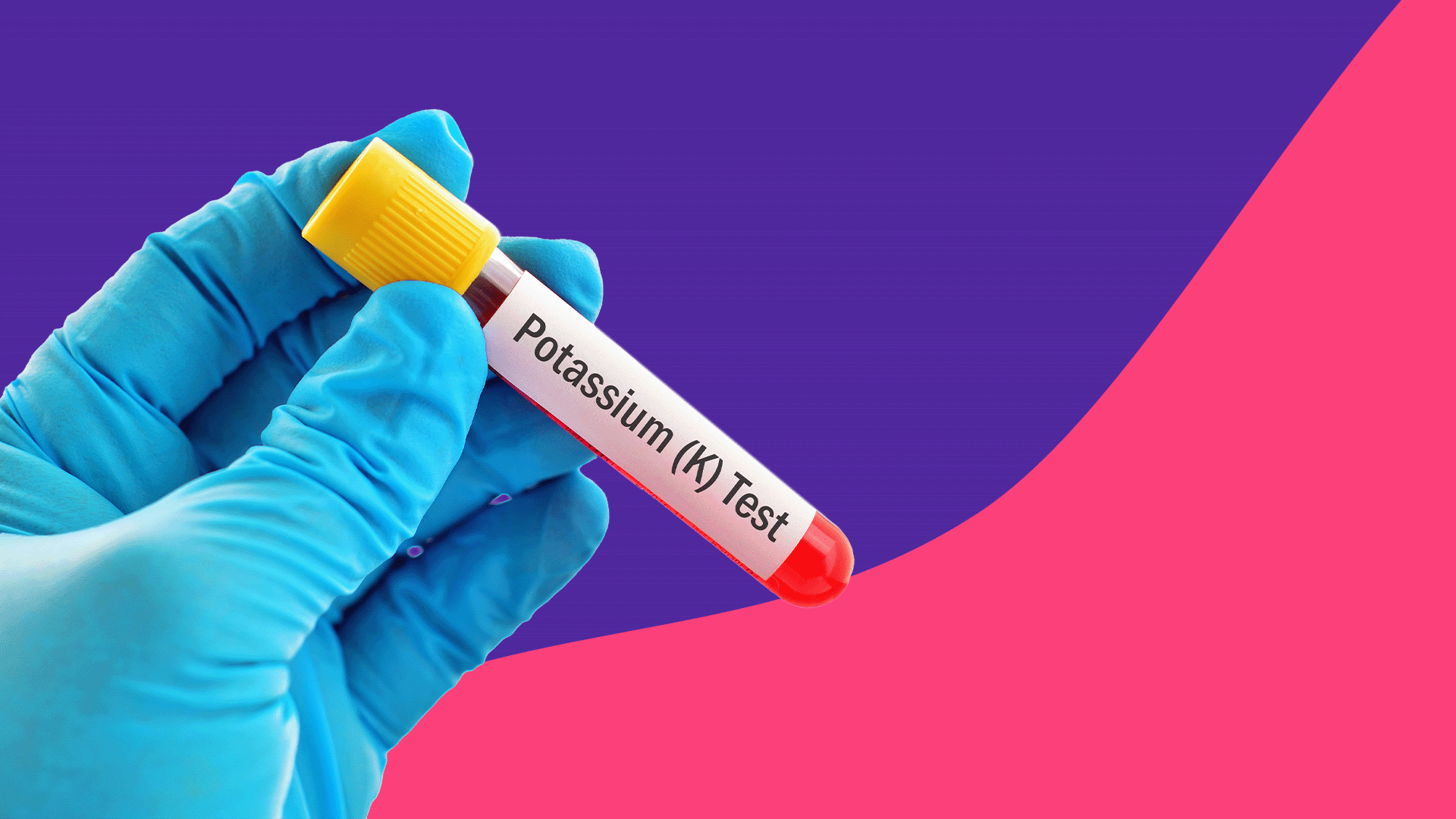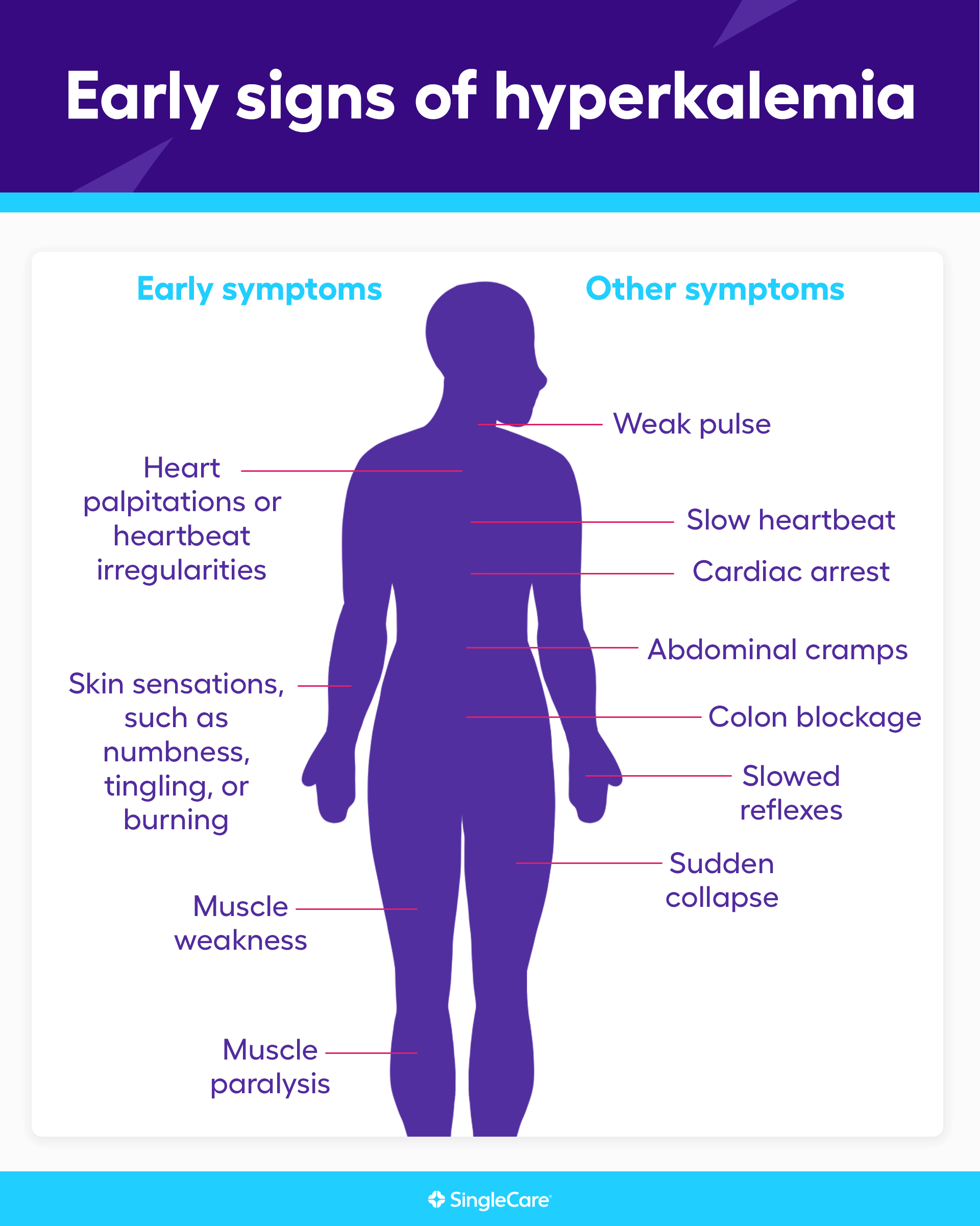- Home
- Symptoms Directory
- Hyperkalemia symptoms
Hyperkalemia symptoms: What are the early signs of hyperkalemia?

Overview: What does hyperkalemia feel like?
Potassium is an electrolyte that is vital to many of the body’s functions. Muscles need it to work. The heart needs it to beat. Nerve fibers need it to fire. Individual cells need it to have the water they need to survive. However, too much potassium is a bad thing.
Hyperkalemia—high potassium levels in the blood—can make people severely ill. What does high potassium feel like? It usually does not cause symptoms if potassium levels aren’t too high. Many people don’t know they have a problem with potassium until it’s spotted on a routine blood test. When potassium levels get too high, noticeable symptoms may appear, such as heartbeats that don’t seem right, muscles getting weak or immovable, and parts of the skin tingling or getting numb. Even with very high potassium, not everyone will have symptoms. Since that’s the case, people should be aware if they’re at risk so that they can be tested regularly.
Key takeaways:
Hyperkalemia is a common health condition that can affect anyone, regardless of age, sex, race, or ethnicity.
There are typically no early signs of hyperkalemia, but very high levels of potassium could cause heart palpitations, muscle weakness, and tingling or other skin sensations.
Serious symptoms of hyperkalemia, such as heartbeat irregularities, muscle weakness, or partial paralysis, may require immediate medical attention.
Hyperkalemia is caused by kidney insufficiency, kidney failure, hormone problems (Addison’s disease, Lupus, insulin deficiency, acidosis), and certain types of medications (ACE inhibitors). You may be at risk for developing hyperkalemia symptoms if you are a man, underweight, on dialysis, or have kidney disease. Other risk factors include diabetes, adrenal gland problems, congestive heart failure, stroke, coronary heart disease, smoking, or medications, such as potassium-sparing diuretics or certain types of blood pressure medications.
Hyperkalemia usually requires a medical diagnosis.
Hyperkalemia generally requires treatment. Symptoms typically resolve within hours of initiating urgent treatment.
Treatment of hyperkalemia may include prescription medications, a low-potassium diet, or dialysis in the most severe cases.
Untreated hyperkalemia could result in complications, such as weakness, paralysis, life-threatening heart arrhythmias, cardiac arrest, and death.
Use SingleCare coupons for sodium polystyrene, furosemide, and albuterolto save up to 80%.
What are the early signs of hyperkalemia?
There may be no early signs of hyperkalemia if it has a gradual onset. Slightly high levels of hyperkalemia are typically asymptomatic. Even severe and life-threatening hyperkalemia can have no symptoms.
Signs of hyperkalemia usually don’t appear until potassium levels are dangerously high, then urgent treatment is required. According to the American Academy of Family Physicians, hyperkalemia symptoms include:
Heart palpitations or heartbeat irregularities
Muscle weakness
Muscle paralysis with loss of muscle tone that starts in the legs and gradually spreads to the arms
Strange skin sensations, such as numbness, tingling, or burning
Other symptoms of hyperkalemia include:
Abdominal cramps
Colon blockage
Slow heartbeat
Weak pulse
Slowed reflexes
Sudden collapse
Cardiac arrest

Hyperkalemia vs. hypokalemia symptoms
Similar to high potassium, low potassium (hypokalemia) frequently has no symptoms and is typically not spotted until it shows up on a routine blood test. Low potassium causes symptoms that are similar to high potassium.
| Hyperkalemia | Hypokalemia | |
| Shared symptoms |
|
|
| Unique symptoms |
|
|
Types of hyperkalemia: How can I tell which one I have?
Hyperkalemia is diagnosed by measuring serum potassium levels with a blood test. Normal potassium levels are between 3.0 and 5.0 mmol/L (or mEq/L). Mild hyperkalemia is diagnosed when those levels exceed 5.5 mmol/L. As the amount of potassium increases in the blood, hyperkalemia is considered moderate or severe. However, it’s not as simple as a number. In actuality, physicians classify types of hyperkalemia based on the risk to the patient. Anyone with elevated potassium who has heartbeat irregularities is always diagnosed with moderate to severe hyperkalemia. ECG abnormalities are always a red flag that demand urgent treatment.
Symptoms usually appear when serum potassium gets above 6.5 mmol/L, which is considered severe hyperkalemia for many healthcare professionals. However, symptoms are often due to how quickly potassium increases. Someone who has long-lasting hyperkalemia may not have symptoms, even when potassium levels are in the severe range. Someone who has a sudden increase in potassium may have symptoms when high potassium is still mild. Whichever scenario it is, it should be determined with a blood test.
Hyperkalemia can also be diagnosed as acute or chronic. Acute hyperkalemia comes on suddenly. It can involve a rapid rise in potassium levels. Chronic hyperkalemia is typically a gradual rise in potassium over time. It’s often not noticeable. Some people with certain medical conditions, such as kidney problems, are vulnerable to persistent high potassium.
When to see a doctor for hyperkalemia symptoms
Immediately visit a healthcare provider if any of the symptoms of hyperkalemia are experienced. If you have any of the risk factors for hyperkalemia, then you should learn the signs of high potassium. Because no one can know for sure if potassium levels are just a bit high or at life-threatening levels, get medical help sooner rather than later. Racing heartbeats, fast breathing, weakness, fatigue, and mental changes are signs that urgent treatment is required.
Hyperkalemia is diagnosed using a blood test. A second test will be used to confirm the first reading because the initial results may be inaccurate. Blood tests are also used to detect the underlying cause, such as kidney function or insulin deficiency. A urine test will help assess kidney function and whether that is causing the high potassium. If potassium levels are high, an electrocardiogram (ECG) will be ordered to see if heartbeats are normal. ECG abnormalities mean that the patient is at a serious risk, so treatment to stabilize the heart and reduce potassium levels will start immediately.
Complications of hyperkalemia
Complications of high potassium include:
Weakness
Paralysis
Heart rhythm abnormalities
Cardiac arrest
Death
RELATED: Does potassium affect your blood pressure?
How to treat hyperkalemia symptoms
Treating hyperkalemia will depend on how high potassium levels are. Mild hyperkalemia can often be treated by prescription medications and some changes in medications or diet. Severe hyperkalemia may need inpatient treatments like IVs or dialysis.
Treatment options include:
Reducing potassium intake
Discontinuing medications that may cause hyperkalemia
Diuretics (water pills) to increase potassium excretion through the urine
Potassium binders, such as sodium polystyrene, to decrease the body’s absorption of potassium
Drugs like sodium bicarbonate or nebulized albuterol to push potassium out of the blood and into the body’s cells
Treatments for severe cases may involve:
Calcium to stabilize heartbeats
Intravenous insulin and glucose to push potassium out of the blood and into the body’s cells
Diuretics, potassium binders, and drugs that push serum potassium into cells
Saline infusion
Dialysis in extreme cases
RELATED: How to lower potassium levels
Living with hyperkalemia
Some people are vulnerable to high levels of potassium. Those with chronic kidney disease, Addison’s disease, hormone disorders, and diabetes are always at risk for hyperkalemia. A few lifestyle changes can help keep high potassium at bay, including:
Eating a low-potassium diet
Avoiding high-potassium foods, such as dried fruits, avocados, and cantaloupe
Avoiding potassium supplements or any supplements with extra potassium
Avoiding salt substitutes
Taking the prescribed medications as instructed
Talking to the doctor about changing medications if you’re taking drugs that cause high potassium, such as potassium-sparing diuretics, digoxin, or hypertension drugs (angiotensin-converting enzyme inhibitors, beta blockers, or angiotensin receptor blockers)
Most importantly, see a healthcare provider regularly
Most people with high potassium won’t know it until it’s accidentally discovered on a blood test. Hyperkalemia often has no symptoms. The best advice is to see a healthcare professional regularly. Routine blood tests can help spot problems early, such as high potassium, low potassium, and other potentially serious problems. This is particularly important if you have any of the risk factors for hyperkalemia, such as diabetes, kidney problems, or the use of high blood pressure medications.
FAQs about hyperkalemia symptoms
What are the early physical signs of hyperkalemia?
There are typically no early physical signs of hyperkalemia. Mild hyperkalemia usually doesn’t have symptoms unless potassium levels are rising rapidly. When signs of hyperkalemia do appear, see a doctor.
What symptoms occur with severe hyperkalemia?
Severe hyperkalemia may cause heart palpitations, heartbeat abnormalities, weakness, paralysis, and bizarre skin sensations. Other symptoms could include digestive system complaints, slow heartbeats, and poor reflexes. Some people may have no symptoms until they collapse.
What are the cardiac symptoms of hyperkalemia?
High potassium can cause the heart to beat irregularly. Many of these changes can only be spotted on an ECG. Heart palpitations and fast heartbeats are more obvious manifestations. If potassium levels are severely high, the heart could stop.
What’s next? Additional resources for people with hyperkalemia symptoms
Test and diagnostics
Hyperkalemia, National Kidney Foundation
Hyperkalemia, StatPearls
Potassium, Rochester Medical Center
Potassium disorders: hypokalemia and hyperkalemia, American Family Physician
Treatments
Hyperkalemia, American Family Physician
Potassium disorders: hypokalemia and hyperkalemia, American Family Physician
Six steps to controlling high potassium, National Kidney Foundation
Scientific studies and clinical trials
Acute hyperkalemia in the emergency department: a summary from a Kidney Disease: improving global outcomes conference, European Journal of Emergency Medicine
Hyperkalemia: pathophysiology, risk factors and consequences,Nephrology Dialysis Transplantation
More information on related health conditions
What causes low potassium?, SingleCare
Josephine Bawab, Pharm.D., graduated from Virginia Commonwealth University School of Pharmacy. She began working in community pharmacy in 2012 and has worked for multiple chain pharmacies since then. She is passionate about helping patients and precepting students. She currently works and resides in Virginia, where she is just a few minutes away from the beach.
...Related Drugs
Related Drug Information
Popular Prescriptions
Support
- Email Us Contact Us
- 24 Hours, 7 Days a Week
(Except Major Holidays)
- Customer Support 844-234-3057
- Provider Support 800-960-6918
Press Center
© 2024 SingleCare Administrators. All Rights Reserved.
* Prescription savings vary by prescription and by pharmacy, and may reach up to 80% off cash price.
Pharmacy names, logos, brands, and other trademarks are the property of their respective owners.
This article is not medical advice. It is intended for general informational purposes and is not meant to be a substitute for professional medical advice, diagnosis, or treatment. Always seek the advice of your physician or other qualified health provider with any questions you may have regarding a medical condition. If you think you may have a medical emergency, immediately call your physician or dial 911.
This is a prescription discount plan. This is NOT insurance nor a Medicare prescription drug plan. The range of prescription discounts provided under this discount plan will vary depending on the prescription and pharmacy where the prescription is purchased and can be up to 80% off the cash price. You are fully responsible for paying your prescriptions at the pharmacy at the time of service, but you will be entitled to receive a discount from the pharmacy in accordance with the specific pre-negotiated discounted rate schedule. Pharmacy names, logos, brands, and other trademarks are the property of their respective owners.Towers Administrators LLC (operating as 'SingleCare Administrators') is the authorized prescription discount plan organization with its administrative office located at 4510 Cox Road, Suite 111, Glen Allen, VA 23060. SingleCare Services LLC ('SingleCare') is the vendor of the prescription discount plan, including their website.website at www.singlecare.com. For additional information, including an up-to-date list of pharmacies, or assistance with any problems related to this prescription drug discount plan, please contact customer service toll free at 844-234-3057, 24 hours a day, 7 days a week (except major holidays). By using the SingleCare prescription discount card or app, you agree to the SingleCare Terms and Conditions found at https://www.singlecare.com/terms-and-conditions
© 2024 SingleCare Administrators. All Rights Reserved.